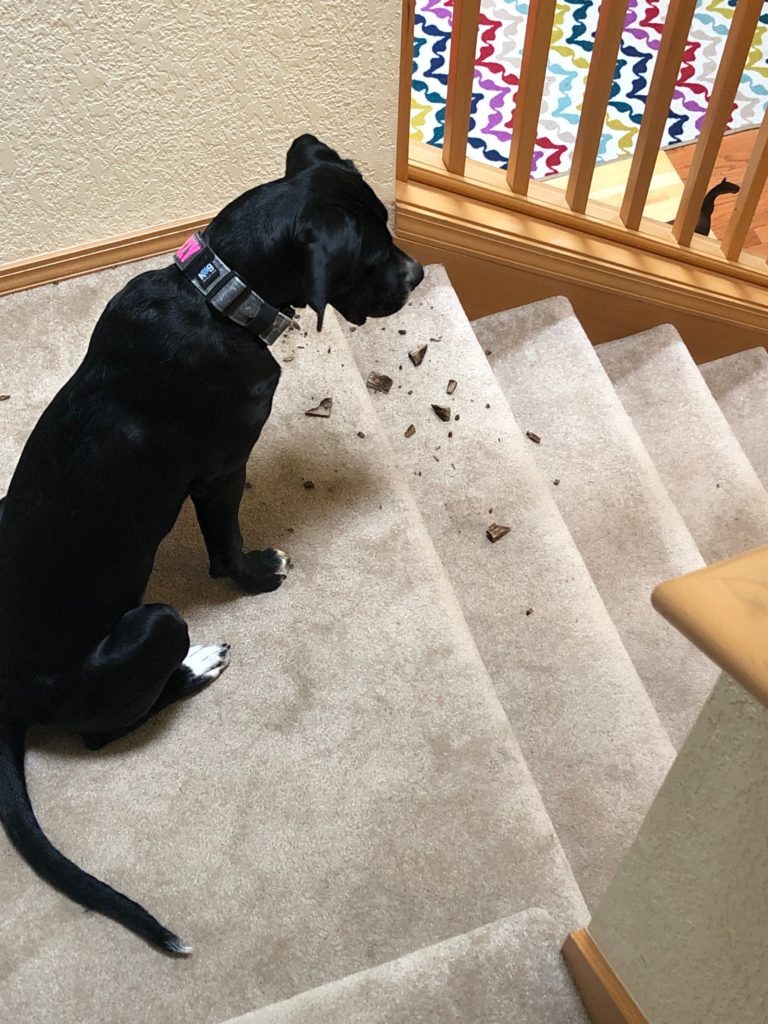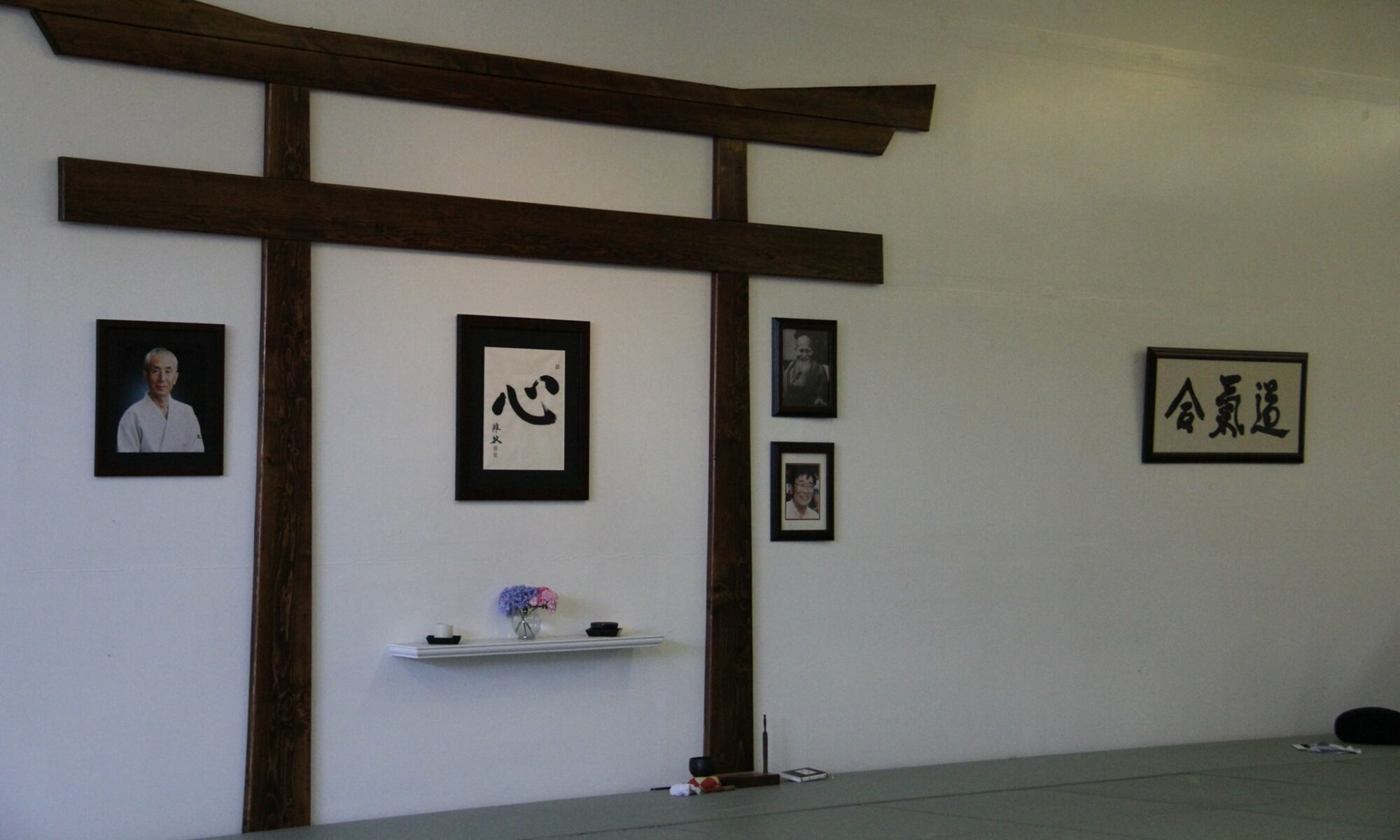This month, Jennifer Sensei will be moving to Portland, Oregon. We’re going to miss her leadership in our Dojo and the interesting techniques she shares when she’s teaching. And, to see her off, we are going to have a short class at 5:30, on Friday August 16th. This will give Jennifer a chance to throw all of us one more time. Following the class we will have a potluck so that we can all have some social time.
New book available at the Dojo
While traveling this spring, Chuck Pailthorp visited Weidenaudojo in Siegen Germany, today one of the few Yuishinkai dojos in Europe. The chief instructor, Stefan Leiendecker, treated me like a visiting family member. He and his partner, Gunda Hoier, were welcoming, generous and delighted that our dojos now have direct contact. Chuck practiced at their dojo one evening, and found the similarities and differences instructive. Among other kindnesses, Stefan and Gunda showed him a few books they currently enjoy, ones they thought other Aikidoka might value. Dance with Heaven & Earth: Life Lessons from Zen & Aikido by Anna Sanner is one he would like to share with you. Ms. Sanner offers beautiful, practical reflections about what it is to practice Aikido well. Her book is written so that one can read a page or several, set the book aside, and bring her suggestions to one’s time on the mat and to everyday life. Chuck has added a copy of her volume to our dojo library.
By Chuck Pailthorp
Aikido in Daily Life: August 2019
We come to our dojo to train so that we’re better able to apply the principles of aikido in our daily lives.
As our practice in Aikido deepens and we begin to embody the principles more easily, our attention is free to move from what our bodies, minds, and spirits are doing and begin to observe the whole of the situation more fully. In practice, this might allow us to better sense the other partners working near us, better sense our instructor watching us (always an opportunity to lose mind-body coordination for a second as we get stuck there), or better sense the kiai of the dojo as we practice. This represents some progress in our training. It also illuminates the model that we want to apply in other parts of our lives outside the dojo.
Whether we’re road-tripping with the family, going for a walk around Capitol Lake, riding a bicycle through Olympia traffic, grocery shopping, or taking out the garbage, we want to practice moving and being present in those movements. As we become better skilled at experiencing mind-body coordination in our daily lives, we free our attention to absorb more of the whole experience around us. This allows us to live more fully, and it forms the foundation for the most important aspect of self-defense – situational awareness. So as we leave the dojo after practice, we should commit to applying what we learned to the things we do each day.
By Nate Weed
Japanese History
I’ve been reading a rather fun martial arts book for the past couple of months. It’s called The Ultimate Samurai Guide: An Insider Looks at Japanese Martial Arts and Surviving in the Land of Bushido and Zen. It’s written by Alexander Bennett, a Kendoka who has been living, working, and training in Japan for close to 25 years. In this book, he describes the “requirement” for western martial artists to have a passing understanding of three significant leaders in Japanese history. Recently, West Sensei, summarized the three leaders and the importance with the following:
Here is a short Japanese saying that is important to know as a practitioner of a Japanese martial art. It is based on the history of Japan with the end of the Sengoku period (戦国時代 Sengoku Jidai, “Age of Warring States”; c. 1467 – c. 1600, and the initiation of the Tokugawa Shogunate that resulted in 240 years of peace. The lines go in order from earliest to the last Shogun:
“If you don’t sing, I will kill you.” Nobunaga Oda
“If you don’t sing, I will make you sing.” Hideyoshi Toyotomi
“If you don’t sing, I will wait until you sing.” Tokugawa Ieyasu
The meaning of the last is – never give up! Very important in Japanese culture.
By Nate Weed and Jim West
Dragons
If you’ve been to the Dojo lately, you’ve probably seen the mural that’s going up beside our building. This mural is being created to commemorate the significant role that Olympia’s Chinese community played in creating our diverse and wonderful city. The artist, Mymy Nguyen, describes the dragon as a “silhouette” representing “a ghost of the past strength, intention and motion of Chinese immigrants who left their homes, crossed the widest ocean, and came to this place for a better life.” The location for this mural is significant because the building was, at one time, a local Chinese grocery that was a center for the community. For additional history, here is a link: http://olympiawa.gov/community/about-olympia/history-of-olympia-washington/olympia-s-chinese-community.aspx

Although Aikido comes from a Japanese lineage that’s different from the Chinese experience, we share a connection to the broader Asian and Pacific Island community. We value our community and, as an organization, are supporting the mural and what it means to our community. Additionally, we believe that our commitment to the art of peace and living in harmony with the energy of the universe aligns nicely with this artistic work. Of note, the characters incorporated into the mural read, “peace, harmony, community.”
The mural’s dedication is scheduled for 12:00pm (noon) on Saturday, August 24, 2019 at the corner of 5th Avenue SW and Columbia Street SE in downtown Olympia. This event will provide a space for the Chinese tradition of “dotting the eye,” or the final brush strokes of painting the eye to bring the dragon to life and to complete the mural.
By Nate Weed
Sensei, Okage sama de
I was reminded recently of a Japanese saying heard while training both in Seattle and in Hawaii – Okage sama de – I am what I am because of you. In the context of Aikido training, the saying was modified slightly to – Sensei, okage sama de – Teacher, I am what I am because of you. It was on honorific statement of gratitude to our teachers as we reflected on all they had given us.
In our training, Okage sama de takes on a broader meaning. We are what we are in part because of our teachers, but also because of our uke during class, our parents, our ancestors, our families, our environment – all the people and things we experience every day. If we are present we benefit greatly from everything in our life.
As Maruyama Sensei says, ‘I have faith in life, and life responds in kind.’ Enjoy this beautiful day, our beautiful city, and each other as we prepare for demonstrations this Friday – and of course a snack-luck!
By Jim West
Aikido in Daily Life: June 2019
We come to our dojo to train so that we’re better able to apply the principles of aikido in our daily lives.
To engage with other human beings with true empathy is incredibly challenging. Our fears of rejection, embarrassment, or perhaps violence take form as we begin to interact with others in uncomfortable situations. As those fears creep into our minds, often without us event realizing it, they begin to create our own resistance, perhaps tell ourselves stories about why we shouldn’t open our selves too much to the experience, and begin to frame our experience in terms of a dualistic relationship (us versus them). As aikidoka, these thoughts and feelings should register as thoughts or feelings that need to be addressed with relaxation and centeredness.
The practices that we do each time we come to the dojo give us an opportunity to experiment with finding relaxation and finding centeredness under the pressure of someone projecting energy toward us (sometimes pleasant, sometimes weird, sometimes unpleasant). If we’re committed to our training and take these lessons seriously, then we improve the probability that we will be able to draw on these same relaxation and centering skills when we have to interact with people at our jobs, the people in our families, and actually all of the people we interact with as we go through our lives.
To make our practice as effective as we can, it’s important for all of us to train with people who make us feel comfortable as well as people who don’t make us feel comfortable. The more we do this, the easier it becomes to overcome the fears that keep us from entering into all of our human interactions with empathy and genuine connections to other people.
By Nate Weed
Promotional Examinations
This month, Aikido Olympia will host promotional examinations. At our dojo, these are opportunities for all of us to get together and support those testing and to socialize afterwords. The approach we take to testing is that people will train hard to be able to successfully demonstrate their techniques and the instructors can typically tell when people have been training hard. Then those people who choose to test themselves by embracing vulnerability and entering into the experience with intentionality and ki. There will be some techniques that the sensei will want to see, and there will be some moments where things don’t come together exactly as planned. Regardless, when everyone has completed their demonstrations, we will all get together and share some food. (It’s a potluck but usually we keep the fare a bit lighter so we call it a “snackluck.”) If you have any questions, please ask one of the sensei or senior students.
Hope to see you all there!
By Nate Weed
Aikido training and new puppies

In April, my family invited a new puppy to come and live with us. As expected, the cute, furry, little bundle of energy was basically just a wild animal who chewed things up and pretty much did whatever she wanted. The question was quickly raised, “How do we get her to behave?” This is a reaction that many of us have when faced with someone or something that doesn’t conform to our expectations. It’s also a reaction that practicing Aikido is intended to overcome.
So what’s the alternative? The alternative to trying to change someone else’s behavior is to look at ourselves and change how we’re behaving. Those familiar with the youth classes at Aikido Olympia, may know that we’ve considered making their slogan: “You can’t change other people, you can only change yourself!” As we’ve been helping the puppy learn how to live in a home with people who have behavior expectations for dogs, it turns out that the most important changes we make are to our own behavior. Furthermore, we’ve all realized that the real learning lies in becoming consistent with those behaviors and with our expectations.
By Nate Weed
Aikido in Daily Life: May 2019
We come to our dojo to train so that we’re better able to apply the principles of aikido in our daily lives.
Aikido is often framed as a solely “defensive” martial art. This is largely do to the instructional approach of having one partner project energy toward the other in the form of a grab or strike, while the other partner responds, to that energy, with a technique. In parallel, many of us take a similar approach in much of our daily lives responding to the energy we are provided. This is normal and it’s something we all do, however our practice is to continually strive to live in harmony with the energy of the universe. This means that we must learn to feel the natural rhythms and find the right timing to intentionally enter and blend. This is not a defensive approach but in many ways an offensive strategy.
In class this past month we experimented with kata-menuchi projections. For those who missed these classes, kata-menuchi techniques require the uke to grab the nage (katatori) and follow quickly with a head-level strike (shomenuchi). The “response” to this type of situation is to apply martial awareness prior to the uke’s movements and taking the initiative by extending energy, and proactively helping our uke find a lower energy state… like resting on the ground.
Kata-menuchi variations are somewhat more “advanced” aikido techniques because they require a bit more awareness and connection before the technique is initiated. They are also considered more advanced techniques because they challenge the idea that aikidoka only respond to the energy provided by others. They also offer an important lesson for our daily lives – we are not just along for the ride and preparing to respond but rather active and mindful participants in our lives. Extending our awareness, trusting our natural intuition, and taking up the slack proactively.
By Nate Weed

